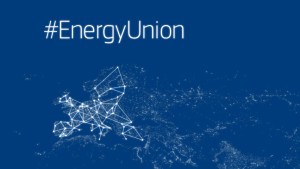The Future of the Energy Union: A Battle over Europe’s Energy Policy
On Thursday, March 19th, Europe’s leaders gathered to decide the future of the European Union’s energy policy. From the outset of his term, Jean-Claude Juncker, current President of the European Commission, has expressed his intention to boost the competitiveness of Europe’s energy industry. However, the escalation of the ongoing Russian-Ukrainian conflict highlights the worrisome dependence on Moscow for energy supply as Gazprom, the Russian state-controlled hydrocarbons company, provides gas to the European Union through pipelines which cross over Ukraine. To put this matter in perspective, The Union relies on external providers for 53% of its energy needs, and more specifically, it singlehandedly depends on Gazprom for a third of its gas imports.
The official policy of the European Union is to maintain its commitment to providing “businesses and consumers access to secure, sustainable, competitive, and affordable energy”. In light of the Ukrainian crisis, this means reducing the EU’s dependence on Gazprom, which has been recently investigated for violating antitrust laws and selling overpriced gas to Eastern European countries. Nonetheless, energy is an issue that affects East and West alike, as any policy decision must be made by the Union’s 28 member states.
The importance of condemning the above was explained by Polish Prime Minister Donald Tusk when he called upon EU leaders to advocate for greater transparency in oil and gas prices, as better access to information would dissipate any market asymmetries which affect consumers’ access to cheaper, better energy alternatives. Tusk’s complaints stem from the fact that Gazprom’s prices are undisclosed, a policy that German diplomats support, namely because they receive lower prices themselves. Experts estimate that Germany receives gas at $310 per thousand cubic meters whereas Poland, for the same amount, pays $370. This price discrepancy reveals a discordant break within the EU’s energy policy, and in order to mend problems such as these, European leaders must revise energy agreements with third party providers. Ideally, if all member states sought better energy partners, perhaps they could even diversify their import destinations and thus improve regional security by minimizing dependence on unpredictable providers.
In a recent interview with El País, Spain’s largest newspaper, current Commissioner for Climate Action and Energy Miguel Arias Cañete stated his belief that, unlike in the past, an attempt to centralize European energy policies could succeed because the Russian threat is more present than ever. While EU leaders are optimistic about this initiative, they refused to give the European Commission the right to veto any national agreement with third parties. This refusal creates important setbacks, as it diminishes the power of an institution needed for making swift and strong decisions. Furthermore, he acknowledges that Europe’s competitiveness is falling behind that of China and the United States, and that this will remain so as long as prices remain uneven throughout the Union.
Sources of energy vary greatly within Europe. While France has pursued almost exclusively a nuclear policy, Germany has dedicated significant investment to renewable energies. Such policies are state matters, according to Commissioner Cañete, but the EU still seeks to make each source as affordable and secure as possible. Furthermore, Cañete believes that new forms of energy acquisition, such as fracking, could make the European Union more competitive, albeit they will have to continue relying on imports as they do not possess significant reserves within the region. Pointing to the United States’ fracking experience, “it has allowed for a spectacular growth, making its energy cheaper and more competitive.” Though cognizant of the security and environmental risks posed by nuclear energy and other sources, Cañete emphasizes the necessity of making competitiveness and growth compatible with security and sustainability.
Although the aforementioned summit was indeed a step forward towards the so-called Energy Union, much more remains to be done. If European leaders truly want to achieve a more equitable and secure policy, they will have to analyze market structures and consider new energy sources, as well as understanding the impact these could have on the economy. If they succeed, a proper energy strategy could bolster the European Union’s productivity and value creation by offsetting input costs and thus gaining significant comparative advantages. However, if they fail, Russia would continue to wield a significant influence over the EU’s energy outlook, a dependence which, when paired with an unpredictable neighbor, could translate into dire consequences as the EU’s foreign policy will be geared towards appeasing its providers rather than standing up for its own agenda.

